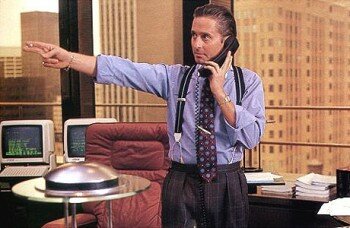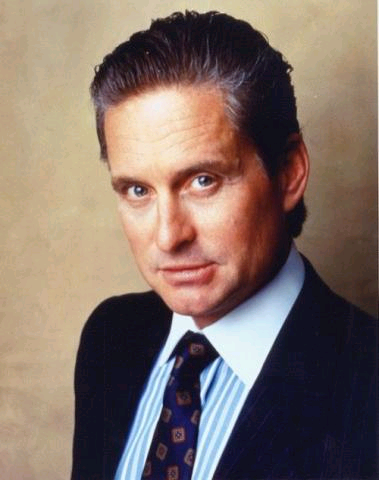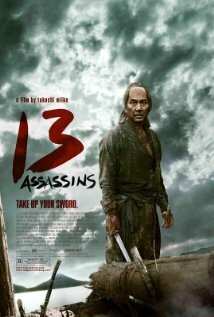Who hasn’t related to a situation from a film at some point in their lives, and what film-makers haven’t put part of their life into a film? Films are generally about the human condition, and that is part of the reason why they’re so appealing to us. It got me thinking about what’s happening in the world right now and how certain movies come to mind.
This segment, entitled It’s Relevant, will focus on the film most similar to the shape of the world’s state as a whole, or something that has happened to me personally (should it be overwhelmingly important!). At the moment, as it has been for the past few weeks, it is seemingly so that the first film featured here should be none other than Oliver Stone’s Wall Street.
With the world (particularly the US and UK/Europe) affected by the global financial crisis, Wall Street has as much worth now as it did when it was released in late 1987/early 1988. At the time, the last recession had hit the US hard just months before and there was suggestion director Stone knew of the impending crisis. Of course that was impossible, but the public always like a conspiracy, don’t they?

Set in 1985 (and boy can you tell – from the music to the interior decoration, it’s blatantly obvious), Wall Street follows stockbroker Bud Fox (Charlie Sheen) and his ambitious rise to the top with financier Gordon Gekko (Michael Douglas in his Oscar-winning role). Within the Hollywood necessity of sub-plots (the budding romance with Daryl Hannah’s Darien and father-son dramas with real-life father Martin Sheen), we see a central character fight out the demons that surface when the going gets really good. Stone shows us the hustle and bustle of Wall Street as a stressful and at times rewarding place, and when Fox has it all, he has it all.
But how much is it gonna cost you? That’s the theme of the film and really, a resounding question for consumers today. The credit crisis has been caused by lenders giving money to those who can’t pay it back, and Fox is in a similar situation before his ambition to get in Gekko’s good books gives him a lifeline. What Wall Street strongly formed in my head was a vision of a drug addict and his dealer. Fox is so consumed by making it big that he would even offer up the company his father’s loyalty resides with – and for what? Happiness? Money can’t buy you that no matter how hard you try! With Gekko as his ‘dealer’, Fox finds his relationships with family and friends ruined, and ultimately his being found out is the final nail in the coffin.
“The point is, ladies and gentleman, that greed, for lack of a better word, is good. Greed is right, greed works. Greed clarifies, cuts through, and captures the essence of the evolutionary spirit. Greed, in all of its forms; greed for life, for money, for love, knowledge has marked the upward surge of mankind. And greed, you mark my words, will not only save Teldar Paper, but that other malfunctioning corporation called the USA. Thank you very much.”
While Gekko was the villain, he did raise an important point within the now infamous ‘Greed Is Good’ speech. Stone’s insistence on Douglas’ performance in this scene to be word perfect pays off as we are delivered a speech that because of the current situation can still give chills. What he says is still applicable today, as now we are being given money by PM Kevin Rudd to spend – be greedy and save the economy! It also lays blame on the US, who at the centre of the crisis should’ve monitored more over dealings. Gekko’s opposite is Lou Mannheim (Hal Holbrook), a workmate who gives balance to Fox’s conscience through moralistic views. In what appear as removed scenes from the rest of the film, we ultimately get the moral of the story through lines such as: “The main thing about money, Bud, is that it makes you do things you don’t want to do.”
Oliver Stone knows how to make an audience think. Wall Street had prominence at the time and it most certainly does now. You can’t help but feel sorry for those in Bud Fox’s position – even Sheen’s choice to cry in the final scene reflects the emotions seen on Wall Street in the past few weeks. It seems that in this scenario, money really does make the world go round.
 Follow the author Katina Vangopoulos on Twitter.
Follow the author Katina Vangopoulos on Twitter.















